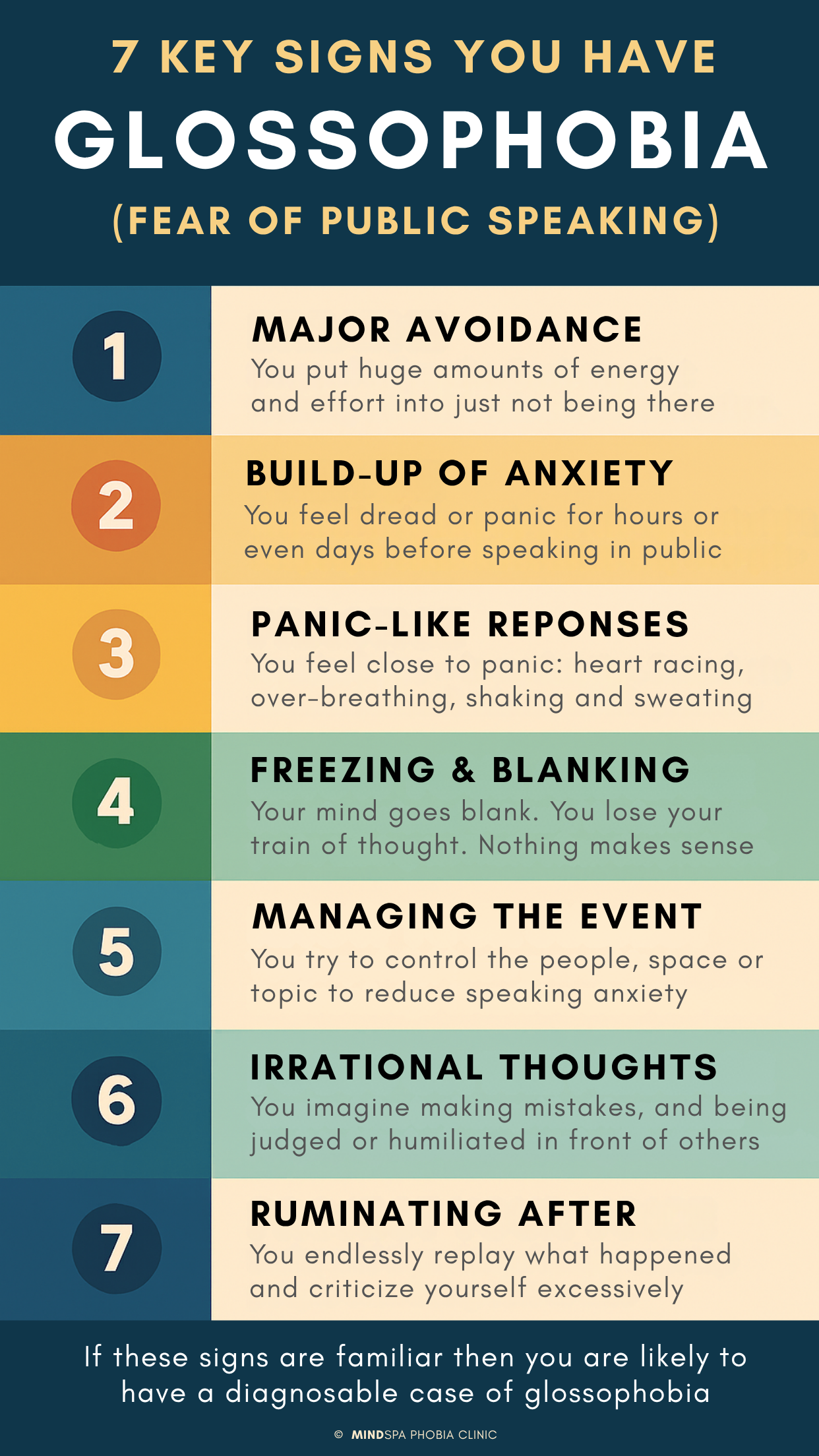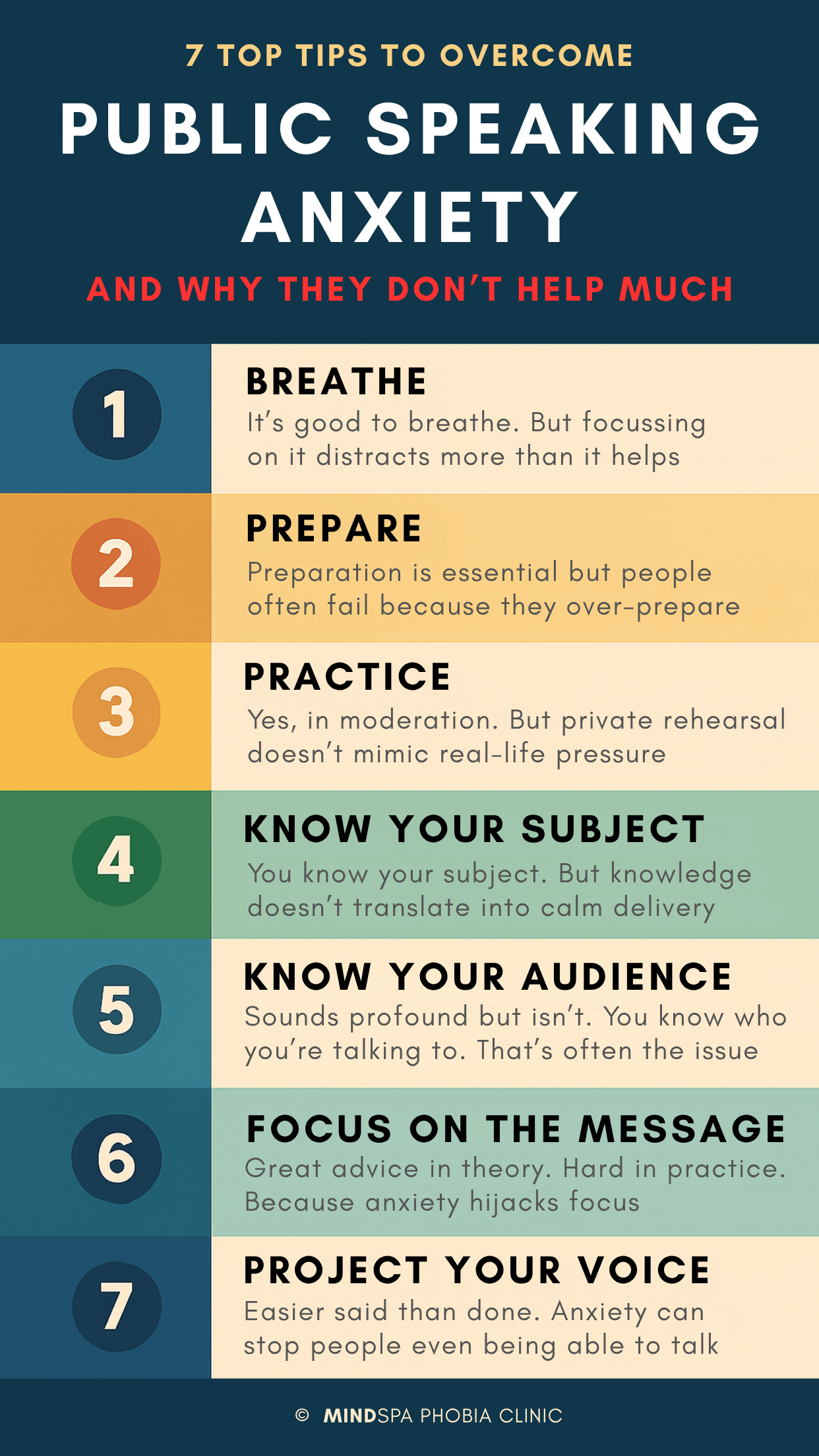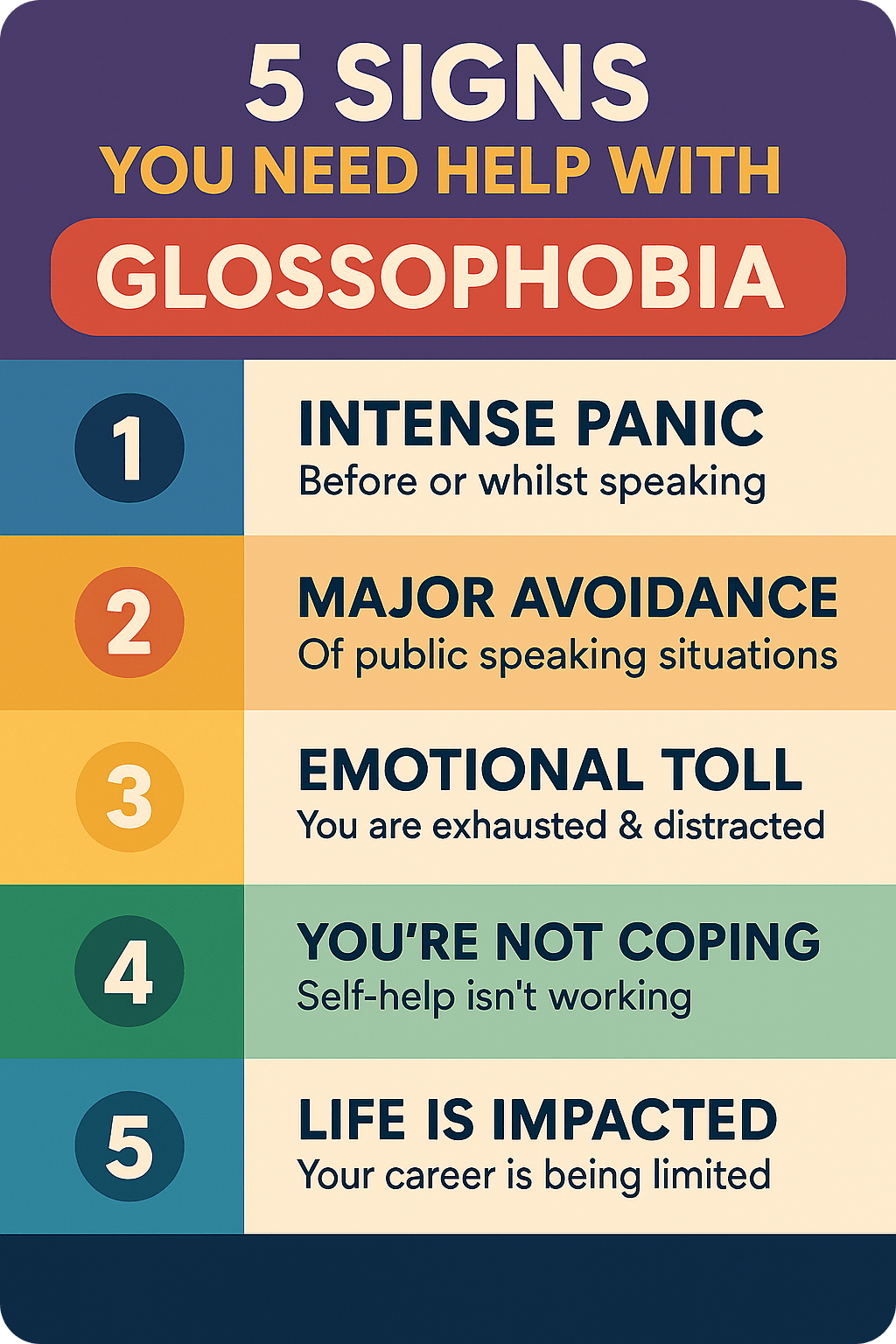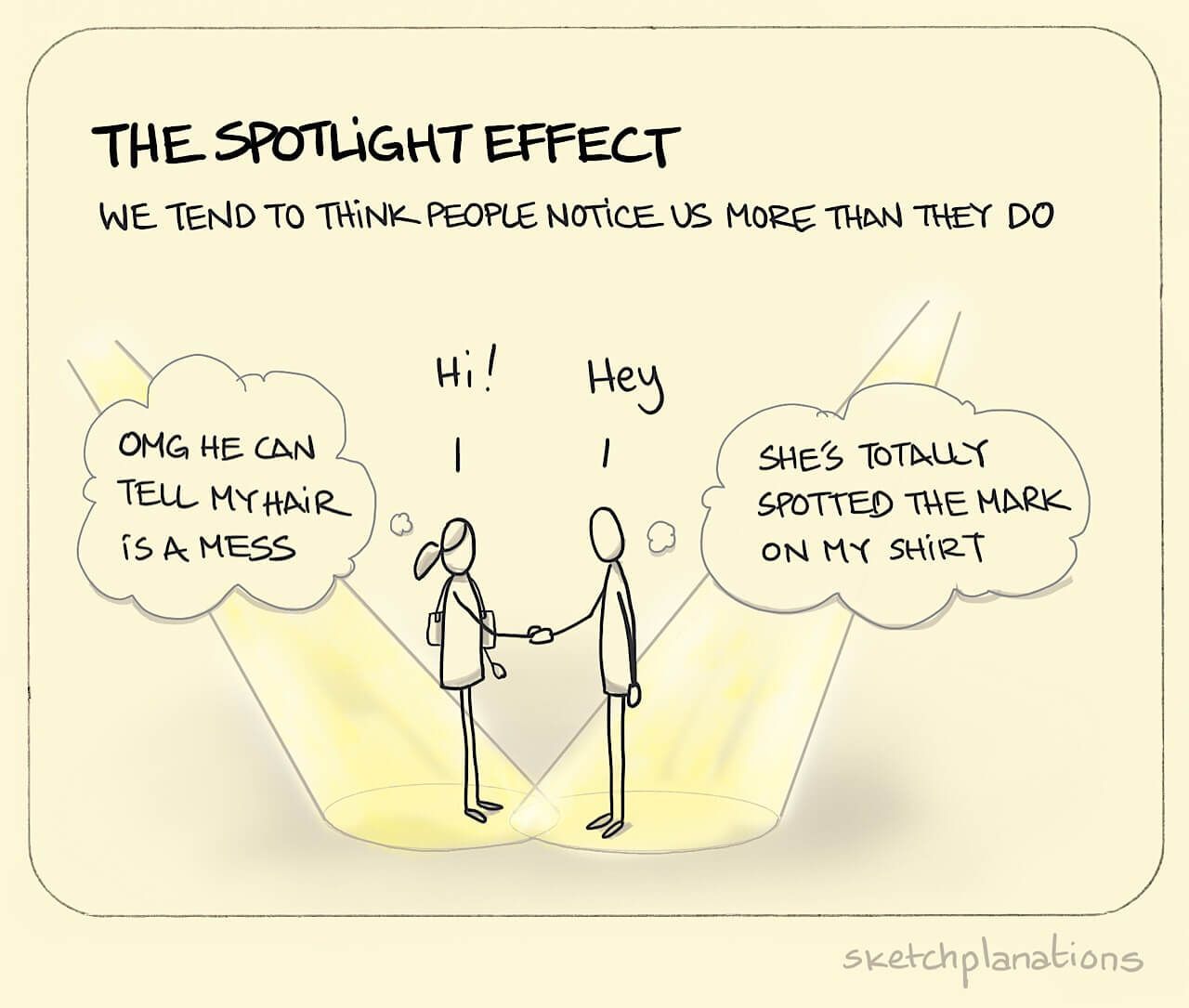A glossary of Glossophobia and the Fear of Public Speaking
Understand key terms related to Glossophobia and therapeutic approaches to overcome it

Anxiety
An emotional and physical response characterized by worry, tension, and nervousness. In relation to glossophobia, it often manifests as fear of public speaking or anticipation of negative judgment. Emotional symptoms include confusion, dread, fear, self-doubt, shame, negative self-talk and loss of self-esteem. Physical symptoms result from the fight-or-flight response (the basic survival response) and include a rush of adrenalin, rapid heartbeat, sweating, shaking, dry mouth, changes in voice, facial freezing, difficulty concentrating and, at its worst, a panic attack.
Sources:
Mindspa Phobia Clinic: Is Glossophobia a Social Anxiety Disorder? Glossophobia.co.uk
Medical News Today: Glossophobia: An Overview. Medical News Today
NSAC: Public Speaking Anxiety
Avoidance
Glossophobia, the fear of public speaking, is often perpetuated by avoidance behaviours. People may completely avoid public speaking situations, manipulate them to minimize their role, or escape them altogether. This reinforces the fear by associating public speaking with negative outcomes. While temporarily relieving anxiety, avoidance hinders career growth and limits personal development.
These behaviours can persist for years, so glossophobia can impact many areas of life. However, when unavoidable situations arise (like wedding speeches, eulogies or professional presentations), most people seek professional help to overcome their public speaking fear and improve their quality of life.
Sources:
Mindspa Phobia Clinic: Glossophobia and Avoidance
Cognitive Behavioural Therapy (CBT)
A structured psychotherapy method aimed at changing unhelpful thought patterns and behaviours. The cognitive aspect targets thoughts, beliefs, and assumptions. The behavioural aspect focuses on how thoughts influence actions.
While CBT can be helpful for some, individuals with glossophobia (the fear of public speaking) often find it of limited help. This is because intellectually (cognitively) they understand public speaking situations are safe, so the cognitive aspect of CBT - trying to correct their thinking and show them that their responses don’t make sense - doesn’t offer a great insight. Moreover, the high anxiety levels associated with glossophobia can make gradual exposure therapy, a core component of CBT, feel overwhelming and potentially exacerbate the fear, hindering progress in overcoming this anxiety disorder.
Cognitive Restructuring
A CBT technique that identifies and replaces irrational or negative beliefs with positive, realistic thoughts. For public speaking, it can help individuals reframe fears about failure or judgment. This may reduce anxiety and build confidence in speaking situations.
Exposure Therapy
A gradual approach to reducing anxiety by repeatedly facing fear-inducing situations. In glossophobia treatment, it involves practicing public speaking in controlled, increasingly challenging scenarios. The aim is to desensitize the individual to the fear trigger.
Fear Response
The body’s automatic reaction to perceived threats, such as public speaking, involving physical and emotional changes. Symptoms may include sweating, trembling, and rapid breathing. This response can interfere with performance as individuals start to focus on what’s happening to them rather than what they are talking about.
Fight or Flight Response
A physiological reaction to stress or danger, preparing the body to confront or escape a threat. In glossophobia, this response is triggered by the prospect of public speaking. It includes symptoms like increased heart rate, adrenaline release, and muscle tension.
Fast Phobia Cure
A neuro-linguistic programming (NLP) technique, sometimes called The Rewind Technique, designed to quickly diminish intense fears, phobias and trauma. It works by reprogramming the brain’s associations with fearful situations, such as public speaking. The method produces reliable, rapid and lasting results.
Flooding
Flooding is an intense form of exposure therapy involving prolonged and intense exposure to the feared situation or trigger. With glossophobia, individuals are immediately exposed to their most feared public speaking scenario. This intense exposure aims to evoke the fear response fully and repeatedly until it diminishes and extinguishes over time. In the treatment of glossophobia and the fear of public speaking, flooding is less common than gradual exposure, but neither is particularly recommended or helpful.
Glossophobia
Glossophobia, also known as speech anxiety, is the intense fear of public speaking. It's a type of social anxiety disorder that can cause significant distress and interfere with careers and daily life.
Causes of glossophobia:
The exact causes of glossophobia are not fully understood, but several factors may contribute:
• Genetics: A predisposition to anxiety may be inherited.
• Past experiences: Negative experiences with public speaking, such as being teased or ridiculed, can contribute to the development of glossophobia.
• Social learning: Observing others who are fearful of public speaking can lead to learned anxiety.
• Perfectionism: High expectations of oneself and a fear of failure can exacerbate glossophobia.
• Negative thinking: Catastrophic thinking and negative self-talk can fuel anxiety and fear.
Physical symptoms of glossophobia:
• Rapid heartbeat
• Sweating
• Trembling
• Shortness of breath
• Nausea
• Dizziness
Psychological symptoms of glossophobia:
• Racing thoughts
• Loss of focus
• Negative self-talk
• Fear of judgment
• Fear of looking stupid
• Fear of making mistakes
• Feeling overwhelmed or out of control
Sources:
Mindspa Phobia Clinic: Public Speaking Phobia
Healthline: Glossophobia: What It Is and How to Treat It
National Institute of Mental Health (NIMH): https://www.nimh.nih.gov/health/statistics/social-anxiety-disorder
Anxiety and Depression Association of America (ADAA): https://adaa.org/
Osmosis: Glossophobia: What Is It, Causes, Diagnosis, Treatment, and More
Guided Imagery
A relaxation technique that uses visualization to imagine calm, successful public speaking experiences. This mental rehearsal helps reduce anxiety and build confidence. Guided imagery combines imagination with relaxation practices to create a positive mindset.
Hypnotherapy
Hypnotherapy is psychotherapy using hypnosis as the main tool to access the subconscious mind and address fears. For glossophobia, hypnotherapy aims to reduce fear triggers and build confidence in speaking situations. Hypnotherapy can complement other anxiety treatments.
NLP (Neuro-Linguistic Programming)
A psychological approach that examines the connection between thoughts, language, and behaviors. NLP helps individuals decondition fear patterns and responses and develop calm responses when speaking in public. Techniques focus on changing mental associations and enhancing self-belief.
Panic
A sudden and overwhelming surge of fear or anxiety, often marked by physical symptoms like rapid breathing and dizziness. In glossophobia, panic may occur before or during public speaking. Effective treatments can prevent or manage panic episodes.
Performance Anxiety
Fear or nervousness about performing in front of an audience, often linked to self-doubt or fear of judgment. In public speaking, this can hinder communication and confidence.
Public Speaking
The act of delivering a speech or presentation to an audience, often a source of anxiety for those with glossophobia. The terms can refer to less formal situations like speaking in meetings and on calls. It requires clear communication and confidence, which can be improved with practice and training. Overcoming public speaking fear opens personal and professional opportunities.
Public Speaking Course
A program designed to teach skills and strategies for effective public speaking. These courses typically include practice presentations, feedback, and anxiety management techniques. They often don’t address the fear and anxiety around public speaking and so may be of limited benefit to people who suffer from glossophobia and want to overcome it.
Psychotherapy
A therapeutic approach that explores and addresses emotional and psychological challenges. For glossophobia, psychotherapy helps uncover the root causes of fear and develop coping mechanisms. It can involve CBT, exposure therapy, or other techniques.
Self-Esteem
A person’s sense of self-worth and confidence in their abilities. Low self-esteem can intensify glossophobia and hinder public speaking performance. Boosting self-esteem is often a key part of overcoming public speaking fears.
Self-Medication
The use of substances like alcohol or drugs to manage public speaking anxiety. While it may provide temporary relief, self-medication often leads to dependency and worsens anxiety over time.
Social Anxiety
A fear of social interactions, including public speaking, driven by concerns about judgment or embarrassment. Social anxiety can significantly impact personal and professional life.
Stage Fright
Stage fright and glossophobia are often used interchangeably to describe the excessive and irrational fear of public speaking or performing in front of others. While "stage fright" is a more common and informal term, often associated with performers like actors, singers, and musicians, glossophobia is the clinically recognized term for this anxiety disorder. Glossophobia encompasses a range of symptoms, including fear, anxiety, and even panic attacks, experienced during public speaking situations.
The Spotlight Effect
The Spotlight Effect is a cognitive bias where individuals overestimate how much others notice and judge their appearance, behavior, or perceived flaws. This can significantly exacerbate glossophobia, the fear of public speaking, as individuals fear intense scrutiny and judgment from the audience. They may believe that minor mistakes or perceived inadequacies are glaringly obvious to everyone present, leading to increased anxiety and a heightened fear of negative evaluation. Recognizing and challenging this bias is crucial for individuals with glossophobia to manage their anxiety and improve their public speaking confidence.
You can read more about the Spotlight Effect and its impact on public speaking anxiety here:
The Spotlight Effect and Glossophobia
Unconscious Mind
The part of the mind that influences thoughts, feelings, and behaviors outside conscious awareness. Fears like glossophobia often stem from unconscious beliefs or past experiences. Therapies like hypnotherapy and NLP target the unconscious mind to reframe fears.










